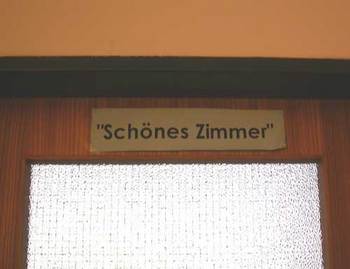Sabine Cretella’s blog, mainly in Italian, but possibly also in English and German (thanks to Sonja).
Monthly Archives: June 2005
Translating into the non-native language
If a German colleague of yours had a website advertising translations into English, and that colleague used an incorrect word as a big heading, what would you do? Invented example (although I think I’ve seen it): if someone wrote “Right” instead of “Law” as a specialization?
Upminster
This should be a change from reports about Fürth.
Here is a mural in Upminster Library showing the history and famous inhabitants of Upminster:
This is the work of Terry Ffyffe (sic), an erstwhile Australian. The most interesting famous person, apart from Ian Dury on the right, is William Derham (18th century vicar and scientist).
For studies of the speed of sound (published in the Philosophical Transactions of the Royal Society), Derham used a pair of synchronised pocket watches, had his friends fire shotguns at distant visible locations (often neighbouring churches), and observed the interval between the flash and the arrival of the sound with his telescopes and a half-second pendulum up the tower of St.Laurence’s (the doors that he inserted on the south side of the church tower are still visible).
I have most been able to impress with General Oglethorpe, though (O’s parents are buried in St. James’, Piccadilly, but I was unable to locate the plaque to them on a recent visit).
Further images of Upminster: a disappointing Chinese takeaway:
Small supermarket:
Gardening centre, actually not in Upminster but South Ockendon:
Integration or else/Integrationskurse für Ausländer
Promoting Germany’s Language Melting Pot – Deutsche Welle article
The courses on German language and life don’t sound bad, of course. But what if you don’t play along?
bq. It’s up to the state immigration authorities to decide whether a person’s German isn’t up to scratch. If officials notice that applicants for residence permits or renewals cannot communicate in simple German, they send them to language classes. Officials at unemployment offices can also recommend foreign jobseekers and social welfare recipients for the courses, and if they refuse to take the classes their benefits will be cut.
I think SPD, CDU/CSU and FDP all believe foreigners should be integrated by hook or by crook.
An American translator visiting was expressing surprise a few weeks ago: in the USA, she said, people gradually integrate over a couple of generations, but not by force.
The local paper reports today that two-language classes for Greek children are about to stop. They survived longer than others, which ended in the early 1990s.
Thanks to Trevor, the creator of langwich sandwich.
Kafka Blog
Kafkas Tagebücher als Blog (deutsch)
Kafka’s diaries as a blog (English)
Thanks to language hat
They get texts from The Kafka Project:
bq. The Project was started in 1998 with the purpose of publishing online all Kafka texts in German, according to the manuscripts. The project is constantly under construction. This multilingual page is also intended to give scholars and Kafka fans a virtual forum to share opinions, essays and translations. Every detail of Kafka’s world will find its place in this site, which aims to become the central hub for all Kafka-interested users.
The site is run by Mauro Nervi, who writes:
bq. You will not find a complete translation of Kafka’s work on this site, nor anywhere on the net. There is a simple reason for that. Just like original texts, translations are protected by copyright and cannot be distributed on the net without the translator’s permission. Therefore you will find here only translations in public domain, or which the translator has granted his permission for.
On the left navigation bar you find the languages of the available translations. Follow the thread and enjoy an expanding corpus of accurate Kafka translations from the original text.
By the way, you can submit translations in any language for publishing on this site. Send them with the translator’s agreement to publication. Translations into English are particularly welcome!
Taken to the cleaners
A senior associate at Baker & McKenzie in London sent an email to a secretary asking her to pay £4 for drycleaning his trousers after she accidentally spilt tomato sauce on them.
His email and her reply have been widely leaked – see reports at cnn.com and in the Times.
bq. Dear Jenny, he wrote. I went to the dry-cleaners at lunch and they said it would cost £4 to remove the ketchup stains. He wrote that it would be much appreciated if he could have the money back.
bq. Ms Amner replied: I must apologise for not getting back to you straight away but due to my mothers sudden illness, death and funeral I have had more pressing issues than your £4. She went on: I apologise for accidentally getting a few splashes of ketchup on your trousers. Obviously your financial need as a senior associate is greater than mine as a mere secretary.
…
bq. One staff member confided: She (Ms Amner) copied it to the whole floor and everyone was in stitches. She had come into work this morning to find a Post-it chasing her for the £4 after having the funeral the day before. Hes so tight.
Thanks to Ingmar.
Trados bought by SDL
Who would have thunk it?
Low in fat/Tief im Fett
I thought this website might have removed its translations by now:
bq. These cheesecakes give you the best of both worlds. They are super simple to make, with our step-by-step instructions you can create your own cheesecake for a fraction of the cost of buying one! Every cheesecake has been handcrafted by Merv J, cheesecake chef extraordinaire.
bq. Diese Käsekuchen geben Ihnen das beste beider Welten. Sie sind Supereinfaches, mit unseren schrittweiseen Anweisungen zu bilden, die Sie Ihren eigenen Käsekuchen für einen Bruch der Kosten des Kaufens ein herstellen können! Jeder Käsekuchen gewesen handcrafted durch Merv J, Käsekuchenchefextraordinaire.
(Other languages available too, in the same quality)
bq. Ajoutez lentement la crème, les oeufs, le lait, le sucre et la vanille aigres au fromage fondu et au battement bien.
Versez dans la croûte et faites cuire 25 minutes au four à 350 degrés ou jusqu’ à la société au milieu.
But the site owner has even chosen to publish Chris Durban’s Onionskin article on his site (the Onionskin is a regular column in the ITI Bulletin):
bq. The translations were done strictly with Machine Translation, so they are not as exact as professional translation. You may find them to be somewhat humorous. We are in the process of professionally translating them, but that may be a few more months…
Chris mentioned on www.flefo.org (the home of the remaining members of the Compuserve FLEFO forum – all are invited to join this project of reviving the forum) that it’s been four years now and no human translations are in sight.
Die Kosten werden gegeneinander aufgehoben
Udo has an entry on Aufhebung.
Die Kosten des Rechtsstreits werden gegeneinander aufgehoben.
The meaning of this term is that the court fees are divided equally between the parties, and each party bears the costs of its own lawyer.
bq. Eine häufige Regelung in gerichtlichen Vergleichen. Sie bedeutet zunächst, dass jede Seite ihre eigenen Anwaltskosten übernimmt. Wenn der Anwalt auf der einen Seite teurer war (z.B. wegen Reisekosten), entsteht kein Erstattungsanspruch.
bq. Auch die Gerichtskosten werden bei der Kostenaufhebung geteilt. Der Beklagte muss dem Kläger also noch die hälftigen Gerichtsgebühren erstatten, die der Kläger von der Gerichtskasse in Rechnung gestellt bekommt. Das gilt auch für bereits angefallene Sachverständigenkosten, Zeugengelder etc.
Law blog recommends using this formula when requesting court orders.
bq. Schreibt man zum Beispiel Jede Seite trägt ihre Kosten selbst bleibt wohl derjenige auf den Gerichtskosten sitzen, der sie eingezahlt hat.
Many translators out of German seem to believe that the phrase means what it sounds like: that all costs and fees are shared fifty-fifty. Why don’t they inform themselves of the meaning of the German term. Years ago I was told by a colleague that the translation should be ‘No order as to costs’. That formula may be as common in English as the other in German, but it means something like ‘Jede Seite trägt ihre Kosten selbst’.
bq. § 92 (1) ZPO: Wenn jede Partei teils obsiegt, teils unterliegt, so sind die Kosten gegeneinander aufzuheben oder verhältnismäßig zu teilen. Sind die Kosten gegeneinander aufgehoben, so fallen die Gerichtskosten jeder Partei zur Hälfte zur Last.
In Switzerland, Wettschlagung der Kosten does mean each party bears its own costs (Metzger, Schweizerisches Juristisches Wörterbuch). Thus from a website with a decision, ‘unter Wettschlagung der Parteikosten und hälftiger Teilung der Gerichtskosten’.
It looks to me as if in Austria, gegeneinander aufheben refers only to each party bearing its own costs, but no doubt someone will correct me if that’s wrong.
LATER NOTE:
Here is some information on Austria kindly provided by Michael Kadlicz, one of three known Austrian legal bloggers:
bq. Der gebräuchliche Ausdruck in Österreich lautet bei Vergleichsabschlüssen: “Bei Kostenaufhebung” Im Ergebnis trägt damit jede Seite ihre Kosten selbst, soweit Gerichtskosten (auch SV_Gebühren) angefallen sind, werden diese 1/2:1/2 getragen. Das versteht sich aus dieser Formulierung mehr oder minder von selbst, es wird aber oft noch durch einen Halbsatz verdeutlicht(zB.: die Gerichtsgebühren werden je zur Hälfte übernommen; die SV-Gebühren tragen die Parteien zu gleichen Teilen oä.)
bq. Bei einer Kostenentscheidung des Gerichts spricht § 43 ZPO von “Kosten gegeneinander aufzuheben oder verhältnismäßig zu theilen”. Wie Du am “theilen” erkennen kannst, gibt es diese Gesetzesstelle schon ein paar Jährchen.
So it does seem that ‘each party bears its own lawyer’s fees’ is more a German than an Austrian thing – in Austria it would take more words to provide it.
“Inverted commas”/”Anführungsstriche”
Pfarrheim St. Maximilian, München.
It’s easy to make fun of the wide use of quotation marks in German, and that’s what Bastel Sick (the Lynne Truss of the German language) did in a recent Spiegel Online.
bq. Auf irgendeinem Flughafen war ihnen ein Schild aufgefallen, das folgende Aufschrift trug: Bitte lassen Sie Ihr “Gepäck” nicht unbeaufsichtigt! Die Häkchen vor und hinter dem Wort Gepäck verliehen dem Ganzen einen geradezu empörend arroganten Unterton. Meine Freunde lasen unwillkürlich zwischen den Zeilen heraus: “Ihre schäbigen Koffer verdienen zwar kaum die Bezeichnung Gepäck, aber lassen Sie sie trotzdem nicht unbeaufsichtigt.”
But translators have to be careful to think whether the inverted commas are needed in the target text. They seem more common in German, despite the familiar list of uses given by Zwiebelfisch: to mark direct speech, to indicate quotations, to emphasize words (‘Das Wort “Standard” schreibt sich am Ende mit “d”.’), to mark titles and to indicate irony. But the following goes a bit further:
bq. Mozarts “Figaro” ist eben nicht der Mann, der Mozart die Haare frisierte, sondern eine Mozartoper. Und wenn man liest: Er sah jeden Montag als erstes in den “Spiegel”, dann weiß man, dass damit nicht der Badezimmerspiegel, sondern das Nachrichtenmagazin gemeint ist. Ich komme übrigens jeden Morgen auf dem Weg zur Arbeit am “Atlantic” vorbei. Stünden die Anführungszeichen nicht da, so könnte man jetzt denken, ich wohnte am Meer. Das “Atlantic” ist aber ein Hotel. Auch Namen von Hotels, Schiffen und Gaststätten können in Anführungszeichen stehen.
Here, I often think the capital letters do the job in English: for us, the Mirror and the mirror are different.
Incidentally, a reader of this blog who prefers to remain anonymous pointed out to me that there is a critical review of Bastian Sick’s book “Der Dativ ist dem Genitiv sein Tod” on amazon.de by Professor Theodor Ickler of Erlangen (there are three links hidden there). I actually met Professor Ickler a few times before he became world-famous as an opponent of the German spelling reform and I think the review is worth reading – it’s now easy to overlook as one of about 100 (it’s dated 26 November 2004).
bq. Das Beste ist der Titel, sonst die gewohnte Mischung aus Belehrung und Parodie, wie in Dutzenden von ähnlichen Werken seit über hundert Jahren (Sprachdummheiten” usw.). Sogar die Beispiele sind großenteils dieselben: scheinbar/anscheinend, gewunken, teilweise Zunahme, das Ultra-Perfekt”, brauchen ohne zu, Stundenkilometer usw. Der Verfasser nimmt den gewohnten normativen Standpunkt ein und stellt immer die Regel” (über deren Herkunft er sich keine Gedanken macht) höher als den tatsächlichen Gebrauch.
I see Professor Ickler has a bloglike Rechtschreibtagebuch with a comments function online.





